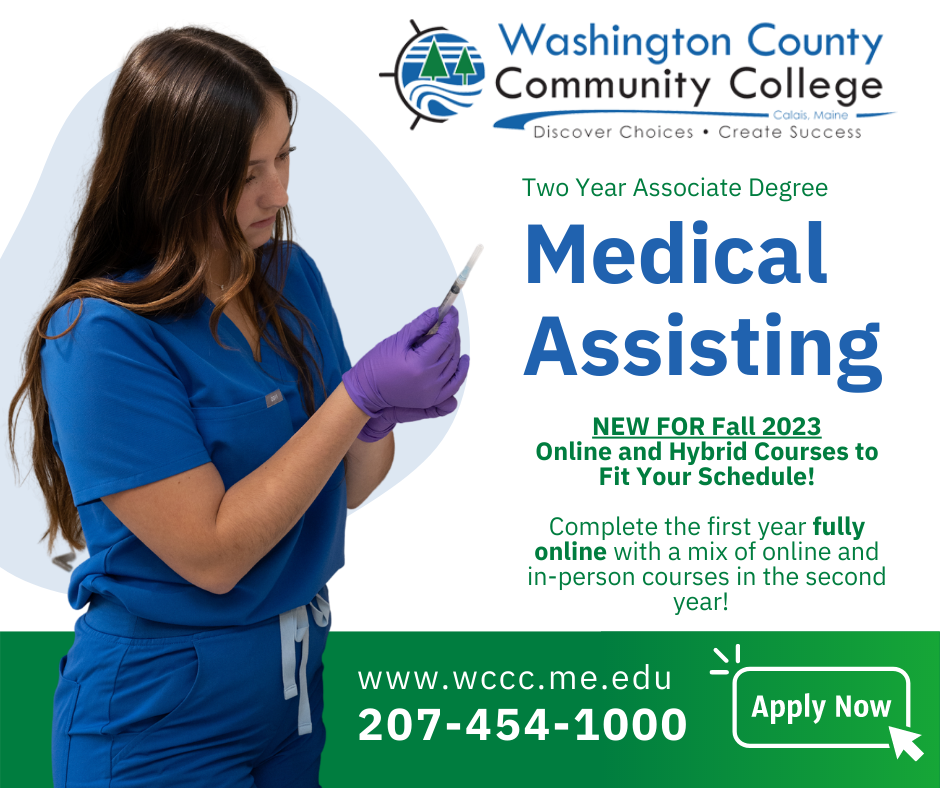Medical Assisting
Accredited by the
Medical Assisting Education Review Board
20 N. Wacker Drive, Suite 1575 Chicago, IL 60606 1-800-228-2262
http://maerb.org/
Associate in Applied Science – 64 credit hours
Program Information & Course List
The Associate of Applied Science in Medical Assisting is an Accredited Associate Degree Program. The two-year program prepares medical assistants who are competent in the cognitive (knowledge), psychomotor (skills), and affective (behavior) learning domains to enter the profession. Medical assistants perform administrative and clinical duties in ambulatory care settings such as clinics, physician’s offices, walk-in clinics and specialty practices. Duties include but are not limited to, preparing exam room, obtaining vital signs, greeting and scheduling patients, patient referrals, administering medications, and obtaining patient specimens.
The WCCC Medical Assisting Program is accredited by the Commission on Accreditation of Allied Health Education Programs upon the recommendation of the Medical Assisting Education Review Board (MAERB). More information about CAAHEP may be found at www.caahep.org.; 25400 U.S. Highway 19 North, Suite 158, Clearwater, FL 3376; 727-210-2350. Graduates are eligible to sit for the Certified Medical Assisting (CMA) examination or the Registered Medical Assistant (RMA) upon completion of the program.
According to the U.S. Bureau of Labor Statistics, “Employment of medical assistants is projected to grow twenty-nine percent from 2016 to 2026, much faster than the average for all occupations.”
Program Goals: The goals of the medical assisting program are to:
- Prepare medical assistants with a wide variety of skills, knowledge, and competencies needed for both rural service areas and diverse medical care settings, where employees are asked to perform varied tasks.
- Provide a foundation that gives the skills for leadership, life- long learning, and community involvement while maintaining basic competencies prior to graduation of an Associate of Applied Science Degree in Medical Assisting.
- Prepare competent entry-level medical assistants in the cognitive (knowledge), psychomotor (skills), and affective (behavior) learning domains.
Program Educational Outcomes: All students enrolled in the Medical Assisting Program must maintain 80% on all competencies within the program to graduate. Upon completion of the Associate in Applied Science degree in the Medical Assistant program, the graduate is prepared to:
- Demonstrate knowledge of medical relationships and effective communication skills among physicians, patients, and families while balancing ethical principles of health care law and standards.
- Demonstrate dedication to the field of patient care with diverse administrative and clinical skills for a variety of patient care settings.
- Exhibit behaviors of cultural awareness, empathy, and sensitivity appropriate for today’s health care setting and patients.
- Exhibit skills, knowledge, and performance to be prepared to meet medical assistant training needs specifically tailored to Washington County health care community while also meeting national standards.
- Qualify for a variety of medical assisting health care positions and to be eligible for national exam.
- AAMA — American Association of Medical Assistants, Certified Medical Assisting Exam (CMA)
- AMT — American Medical Technologist, Registered Medical Assisting Exam (RMA)
Minimum Standards: Successful completion of catalog program curricula offered by the college entitles the student to earn an associate degree in Medical Assisting. Minimum graduation standards are the following: Passing grade in all courses that are applied to program requirements, 2.0 grade point average (GPA) in college major and 2.0 cumulative GPA. In addition, WCCC Medical Assisting students are required to pass all cognitive, psychomotor and affective competencies with a grade of 80 or greater and pass all medical assisting courses (designated with an MDT prefix) with a grade of 80 or greater in order to graduate from the program.
Processes by which students may perform clinical work while enrolled in the program: Students will perform simulated clinical work in the classroom by use of patient simulators, classroom role playing and case studies. Additional clinical work will be performed on real patients in a practicum/internship setting. A 165-hour Clinical Cooperative Practicum Course is a requirement of the medical assisting program. This is an up-paid practicum facilitated by the Practicum Coordinator and supervised by a Clinical Preceptor.
Certified Clinical Medical Assisting
Medical Studies Contact
Cindy Moholland
Medical Assisting Instructor/Department Chair
207.454.1016
cmoholland@wccc.me.edu
The Medical Assisting program requires completion of the Student Disclosure of Criminal Convictions, Pending Criminal Charges and Certain Disqualifications. Completion of this form does not automatically deny admission to the program. Prospective applicants will meet with the Dean of Enrollment Management and Student Services to review information.




